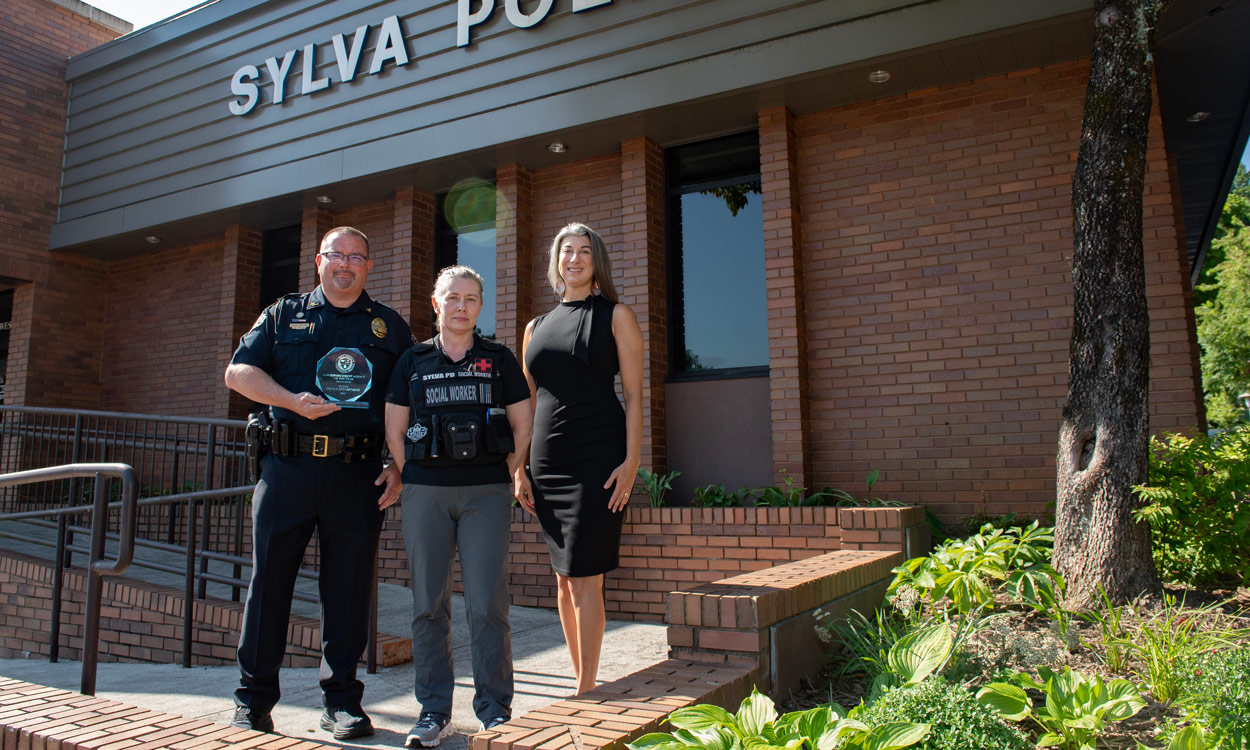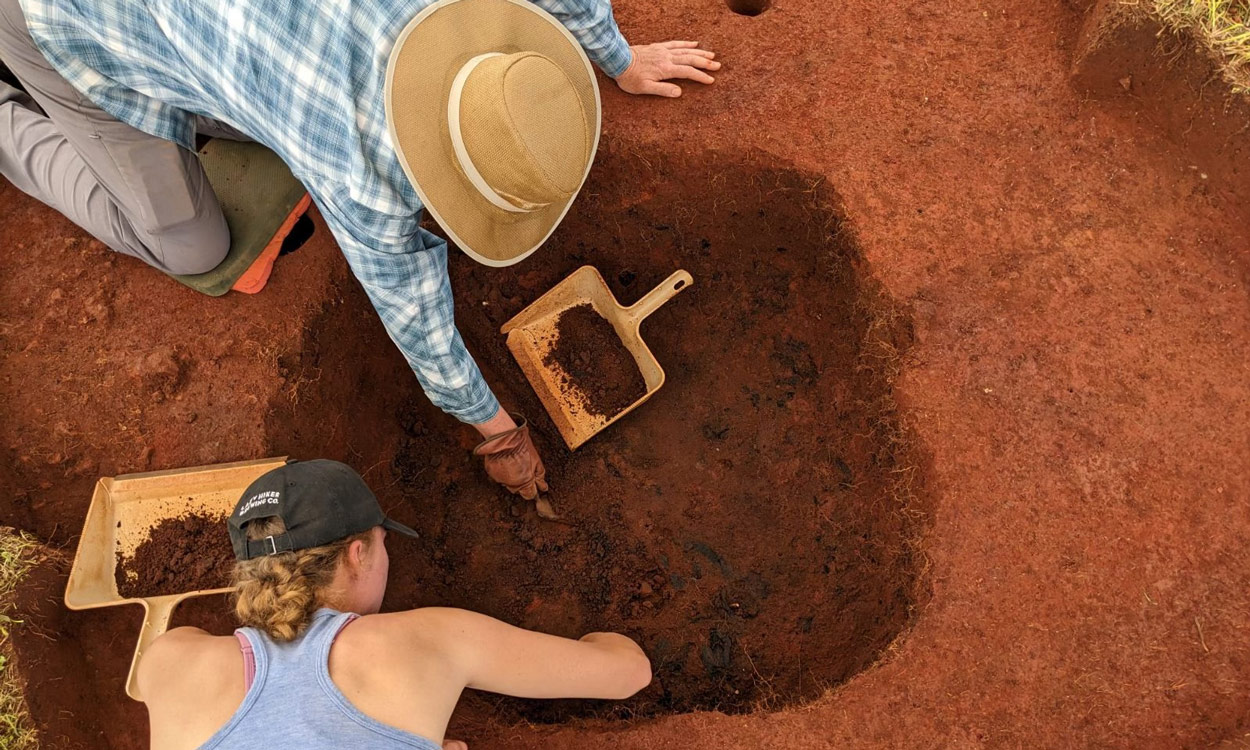Community Care Program receives grant from Dogwood Health Trust to expand in WNC

From left to right: Sylva Police Chief Chris Hatton, Community Care Coordinator Galadriel Lavere and Cyndy Caravelis.
By Julia Duvall
What started as a research project is now a grant-supported program at Western Carolina University.
WCU’s Community Care Program will expand to more counties in Western North Carolina thanks to a $140,000 grant from Dogwood Health Trust.
Two WCU faculty members Cyndy Caravelis, professor of criminal justice, and Katy Allen, professor of social work, began the research project a few years ago as a response to a growing need in Jackson County for alternative policing models to connect community members to resources in non-criminal situations.
The Community Care Program began by partnering with the Sylva Police Department to place a graduate-level intern from the social work program within the police department to serve in the role of Community Care coordinator. The coordinator’s primary function is to follow up with citizens involved in police calls for services and to also connect victims with community resources. When a Sylva police officer encounters an individual that they identify as someone who could use additional attention, the officer submits a referral to the coordinator.
There is no cost to taxpayers for this service.
“We are beginning our third year of the program and after expanding to the Boone Police Department and having two years of positive results from multiple agencies, we began seeking out grant funding to support the project,” Caravelis said. “We had a series of meetings with Dogwood Health Trust and one of the reasons they were interested in this project is because it is tackling some of the issues that we are really struggling with, especially in rural counties.”
Those issues include substance abuse, mental health and trying to find alternative policing models for non-criminal police calls.
“Adding agencies to the program requires a pre-site visit and conversations with town leadership to make sure that the culture of their police department would be accepting of social work participation,” Caravelis said.
After the pilot year, the program has been growing at a rate of one agency per semester.
Dogwood Health Trust allocated the program $140,000 for the first year and after a midterm report is submitted in January 2024, Caravelis and Allen will apply for year two funding. The funding will support a full-time social work position at the Sylva Police Department and support the creation of a manual and website for other counties to be able to implement the program.
“For this grant, Dogwood’s interest is of course sustainable growth, so one of the things that we're doing with this grant is creating a comprehensive manual on what implementing the program looks like,” Caravelis said. “We share what protocols need to be put in place to make it successful with a list of FAQs such as ethical considerations for social workers and safety precautions. Dogwood is very interested in having this be the model for rural alternative law enforcement, so we are working to pull all this information together into an informational format before we begin outreach to other counties.”
Caravelis and Allen, along with their students, are planning to host police chiefs and sheriffs from the state’s 17 westernmost counties at WCU next spring to present the Community Care Program and how it can benefit their own communities and departments.
“Katy (Allen) is the social work field coordinator for WCU, so she has counterparts throughout the state and once we have the materials and model up and running, we will be able to create a statewide network of the Community Care Program,” Caravelis said. “The focus of the program right now is rural agencies because those communities are greatly underserved and have small departments and small budgets.”
Finding a way to make the program a taxpayer free service, while also giving students the experience they need, is a key part of the goal of expanding the program to the westernmost counties.
“The students are in the coordinator role for the entire school year, so that really gives them a chance to get to know the law enforcement agency and form relationships with other agencies and supportive nonprofits,” Caravelis said. “Our goal is that once the department shows a benefit to their communities, they can then work towards adding a permanent, full-time position. For example, our current Sylva PD coordinator, Galadriel Lavere, transitioned to a full-time position in July with the help of the Dogwood Health Trust grant. We will now be able to compile supportive data to show how beneficial having a full-time position will be to the departments.”
During the spring 2024 semester, Caravelis hopes to be able to have another intern assist the full-time position at the Sylva Police Department.
“This intern position will support the full-time position because once people know that this service exists, there is no shortage of its use by the community,” Caravelis said. “Sylva is a town of roughly 2,800 people and the coordinator is very busy. Because a lot of these cases are very complex, it takes a long time to figure out what services they have sought out in the past and what exactly is needed in the present.”
In addition to the Sylva Police Department and Boone Police Department, the Community Care Program has been adopted by the WCU Police.
“We started the program on campus in spring of 2023 and will continue it in the 2023-2024 school year. The liaison position for WCU’s police force is different because it is more of a bridge between students and the resources available,” Caravelis said. “It's less about triaging and more about making sure students are aware of the programming and resources that already exist.”
Caravelis credits WCU Police chief Steve Lillard for his support in implementing the program on campus.
“Chief Lillard has been so great in working with us to get the program started on campus and truly recognizes that the best way to modernize policing is to increase transparency and communication,” Caravelis said. “The more resources that we can have partnering with WCU Police, the more accessible they become to students.”
This upcoming school year, Caravelis plans to reach out to the various student organizations on campus to share the programming available through WCU Police as well as working with the Eastern Band of Cherokee Indians for placing students in internships.
“This semester, we are placing a student with the Office of the Tribal Prosecutor which of course requires a lot of victim and offender interaction and caseload management,” Caravelis said. “The goal is to have an entire network of Community Care coordinators across not only this region but also the state.”
Through the Community Care Program, the root causes of homelessness, drug abuse and other issues plaguing rural communities are being addressed head-on.
“I often hear people say, ‘What are we going to do about these issues, there are too many to fix?’ and well, through this program, we are able to do something concrete,” Caravelis said. “We are getting to the root of the issues by connecting individuals to resources and while no, you can’t change a community overnight and just make the issues vanish; but person by person, you are laying the foundation for real change.”
Caravelis praises the support of WCU, Provost Richard Starnes and Chancellor Kelli R. Brown for their support in community-based initiatives.
“Without the administrative support of these programs and the encouragement to apply for grants, we would have never been able to do this.” Caravelis said. “This program is interdisciplinary, it is engaging the community and bringing all the stakeholders to the table to assist underserved populations. It's everything that we are supposed to be doing as a Carnegie Engaged Institution. We are getting to see the real impact and getting actual lives change as a result.”
In addition to the grant funding, Caravelis recently found out some other exciting news.
The Sylva Police Department was chosen as the 2023 North Carolina Law Enforcement Agency of the Year by the North Carolina Police Executives Association. The association cited the Community Care partnership as groundbreaking innovation for rural agencies and commended the Sylva Police Department for their innovative approach to alternative responder protocols. Caravelis and other representatives from the Community Care Program and Sylva Police Department traveled to Wilmington on July 18 to accept the award.
“This program is all about meeting people where they are,” Caravelis said. “We are not making the community member do an extensive intake before they can talk to someone who can help. We are sitting on a curb, talking with them and figuring out their needs and how to best connect them to resources. Through this, we are able to give our students real world, non-sterile experience that goes right along with what they will be doing in their careers.”
For more information about the Community Care Program, contact Caravelis at ccaravelis@wcu.edu or Allen at cmallen@wcu.edu.

